Love Trump? Hate Him? That’s No Way to Invest.
Partisan political views only increase the odds of making poor financial decisions.
Bloomberg, January 20, 2017.
Today is the day that Donald J. Trump will be inaugurated as the 45th U.S. president.
From weeks before the election right up until today, talking heads have been telling us how momentous this will be for the stock market. First, the pundits warned us of an imminent market slump. Then when the markets defied their expectations and rallied after his surprise victory, they crafted an explanatory narrative of deregulation, infrastructure stimulus and tax cuts. Now, with markets going nowhere, the sages are blaming high U.S. stock valuation.
History strongly suggests these folks should pour themselves a tall glass of STFU and be roundly ignored by you, the investor class. There are many reasons why this is so, but let’s begin with a few choice examples from just before and shortly after our departing president, Barack Obama, was elected.
On March 6, 2009, the Wall Street Journal published an op-ed with the unfortunate headline “Obama’s Radicalism Is Killing the Dow” by the Republican economic operative, Michael Boskin. I say “unfortunate” because that was just three days before the market’s low point. The Standard & Poor’s 500 Index has since gained 293 percent, while the Dow is up almost as much.
Radical Obama Was Going to Crash MarketsSource: Bloomberg
Consider another poorly timed article. This one appeared in the Washington Post on Sept. 14, 2008, with the headline, “Quit Doling Out That Bad-Economy Line.” This article, by Donald Luskin, explained that the economy was great and all the worrying was like “a virus.” This was, need I remind you, the very day before Lehman Brothers Holdings Inc. failed and two days before American International Group Inc. had to be bailed out by the federal government, sending the financial crisis into high gear. Oh, and this article appeared 10 months after the recession had started, and in the midst of a 57 percent stock-market crash.
These two epic fails are really just political screeds in the guise of economic analysis, both of which turned out to be monumental money losers for anyone foolish enough to listen to them.
They also both illustrate some of my favorite investment errors: They create a false narrative; confuse emotional, ideological belief with investing advice and mix up correlation with causation. Both were written by ministers without portfolios — meaning those outside of finance with no skin in the game. Pundits playing politics don’t have the same negative consequences for being wrong that real asset managers do.
I keep repeating this, but only because it is so true: politics and investing do not mix.
And this is true not just when the president is a Democrat; recall the general response to Republican President George W. Bush and his 2003 tax cuts? Politically biased investors expected the cuts to blow up the deficit, hurt job creation and cause a host of other problems. These folks confused what their actual jobs were: managing money, not cooking up largely ignored policy papers at some bought-and-paid-for think tank. Markets didn’t care about those political assessments, and they rallied 94 percent during the four years after the tax cuts were adopted.
This is why people active in party politics — donors, organizers, true believers and activists — shouldn’t be allowed anywhere near your investment portfolio or your psyche. And, the reverse is true: anyone running money should avoid party politics, since it leads to a lack of the objectivity and dispassion needed to do the job well. Politics is a huge distraction; it is rarely compartmentalized, and typically leads to ill-considered emotional decision-making.
These examples don’t suggest that presidents are inconsequential or cannot have an impact on markets and the economy. As we have detailed before, the holders of that office have a potentially enormous affect. Consider instead how lethal it might be to your portfolio to let your personal politics influence your expectations and outlook. This is inherently very dangerous to your objectivity because once your objectivity is compromised your investing decisions are invariably disastrous.
Yes, Trump as of today is president. Your personal view of him — either positive or negative — is irrelevant to how you should be managing your investments.
~~~
I originally published this at Bloomberg, January 20, 2017.. All of my Bloomberg columns can be found here and here.


